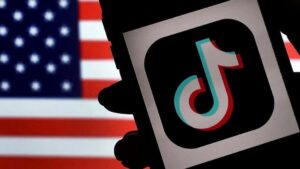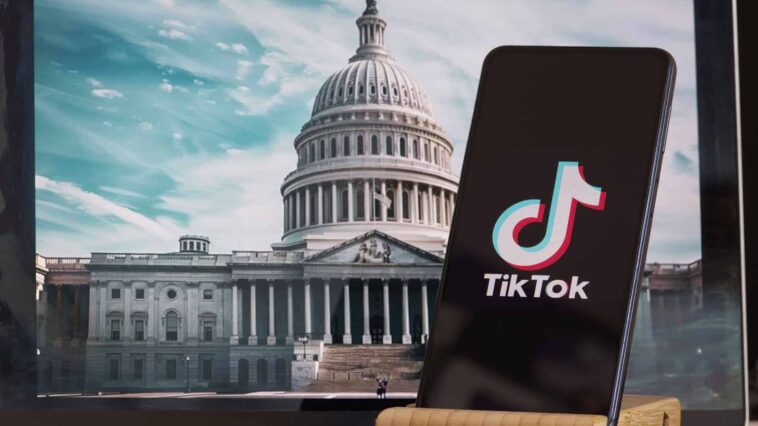In a decision with significant implications for technology and national security, a federal appeals court has upheld a law that could result in TikTok’s ban in the United States unless its Chinese parent company, ByteDance, sells its stake in the platform. The unanimous ruling from the U.S. Court of Appeals for the District of Columbia Circuit deals another blow to TikTok. This widely popular video-sharing app has become a focal point of political and legal battles over its alleged ties to the Chinese government.
The ruling, delivered by a three-judge panel, sided with the Department of Justice and rejected a petition by TikTok and ByteDance to overturn the legislation. In the majority opinion, Senior Judge Douglas Ginsburg stated that the law was constitutional and aimed at safeguarding U.S. national security. He emphasized that the measures outlined in the legislation were designed to address the risks posed by foreign adversaries, not to suppress free speech.
The law, signed into effect earlier this year by President Joe Biden, requires TikTok to sever ties with ByteDance by January 19 or face removal from app stores and web-hosting services across the United States. A one-time 90-day extension may be granted if a sale is in progress by the deadline. The ruling intensifies pressure on TikTok, which must now decide whether to comply with the law, continue its legal challenges, or risk being banned entirely.
Lawmakers and security officials have expressed deep concerns about TikTok’s connections to the Chinese government, citing potential data collection and manipulation threats. The app’s algorithm recommends content to users and has been described as a potential tool for espionage or influence. Under Chinese national security laws, companies like ByteDance must cooperate with intelligence agencies, further heightening suspicions about the app’s operations.

Attorney General Merrick Garland applauded the court’s decision, calling it a necessary step to protect Americans from foreign influence. In a statement, Garland argued that the law was critical to counter China’s efforts to collect sensitive data and manipulate content delivered to U.S. audiences. He emphasized that the legislation aligns with the Constitution and demonstrates the government’s commitment to defending national security.
The court’s decision also highlights a broader legal and political struggle. TikTok and ByteDance have argued that the legislation violates the First Amendment and is based on speculative concerns about data security and content manipulation. TikTok spokesperson Michael Hughes criticized the law as flawed and expressed confidence that the Supreme Court would overturn the decision, citing the court’s history of protecting free speech. He described the government’s allegations as hypothetical and unsupported by substantial evidence.
The legal challenge has sharpened the debate over national security and digital freedom. During oral arguments, TikTok’s attorneys argued that the legislation imposes unprecedented restrictions on free speech and represents an overreach of government authority. They contended that banning TikTok would infringe on the rights of millions of Americans who use the platform for communication and expression. The platform’s lawyer, Andrew Pincus, characterized the law as “extraordinary” and warned that it sets a dangerous precedent for government control over foreign-owned platforms.
Despite these arguments, the appeals court found the government’s national security concerns compelling. In his opinion, Judge Ginsburg noted that the law targets companies owned or controlled by foreign adversaries, not specifically TikTok. He rejected claims that the legislation unfairly singled out the app and emphasized that it is narrowly tailored to address threats posed by foreign entities.
The ruling has left TikTok’s U.S. users in a state of uncertainty. The app has become a cultural phenomenon with more than 170 million American users and a key platform for entertainment, communication, and commerce. The potential ban would disrupt millions of lives and force users to seek alternative platforms. The court acknowledged the significant burden this places on TikTok users but attributed the responsibility to the Chinese government, not the U.S. administration.
As the January 19 deadline approaches, TikTok’s future in the United States hangs in the balance. The company has vowed to fight the ruling, and both sides have requested expedited consideration from the Supreme Court. If the justices agree to hear the case, they could pause the law while legal arguments are reviewed. However, if the Supreme Court declines to intervene, the appeals court ruling will stand, effectively barring TikTok from operating in the U.S.
The controversy surrounding TikTok has also reignited political debates over the role of foreign-owned technology companies in national security. During his first term, President-elect Donald Trump sought to ban TikTok but later reversed his stance during his re-election campaign, promising to secure the app’s future in the U.S. Trump has since reiterated his commitment to protecting TikTok’s operations through an American-led ownership deal. Congressional leaders have similarly expressed optimism that the app could remain in the U.S. under new ownership.
The ruling’s broader implications extend beyond TikTok. Legal experts warn that the case sets a precedent for government intervention in foreign-owned platforms and highlights the challenges of balancing free speech with national security. Critics of the law argue that it could pave the way for future restrictions on other platforms, raising concerns about overreach and censorship.

For TikTok, the challenges extend beyond legal battles. The Chinese government has vowed to block the sale of the app’s algorithm, complicating any potential divestiture. ByteDance has argued that rebuilding the algorithm would be technically and commercially unfeasible. The company’s attorneys contend that the app’s architecture, developed over the years by thousands of engineers, cannot be replaced without dismantling its core functionality.
The appeals court ruling underscores the complexities of the debate, with judges recognizing national security concerns and the potential impact on free speech. The legal battle has drawn attention to the power and influence of tech platforms in an increasingly interconnected world and the vulnerabilities that come with foreign ownership.
As TikTok’s legal team prepares for a possible Supreme Court showdown, the stakes remain high for the app’s future in the U.S. The case has become a defining moment in the ongoing struggle to balance global technology’s benefits with national security’s imperatives. For now, TikTok and its users must navigate an uncertain future while lawmakers and courts grapple with the broader questions of digital freedom and security in the 21st century.





